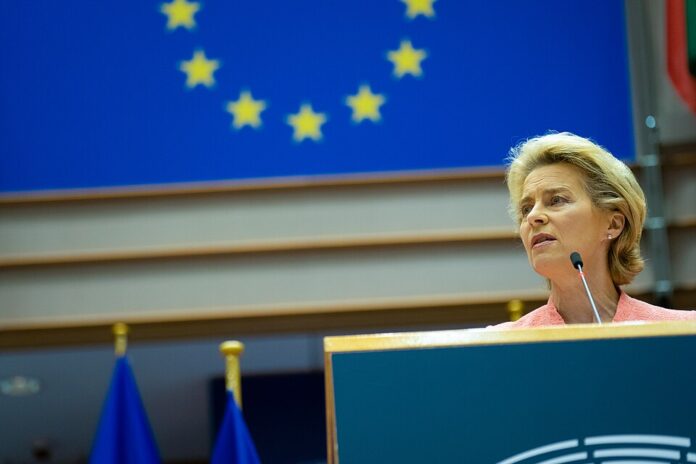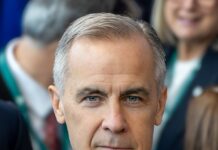Earlier this week, European Commission President Ursula von der Leyen delivered her annual “State of the Union” speech in Strasbourg. The German technocrat’s popularity is strongly under pressure, according to a newly release poll, which reveals that 60 percent of citizens of big EU member states think she should resign.
Whether her speech will change that sentiment much, is questionable. Von der Leyen used it to provide more detail on topics like her institution’s vision on the EU response to Russia’s invasion of Ukraine, Israel’s war in Gaza and the EU-US trade deal she negotiated with US President Trump over the Summer.
Lex Hoogduin, a leading Dutch financial commentator and academic, who once served as the advisor to the first President of the European Central Bank, summed it up as follows:
“It was, as expected, a whole series of policy intentions and initiatives in an ever-growing number of areas where, in my opinion, the EU should not interfere: housing market policy, poverty alleviation (by 2050, all poverty in “Europe” is supposed to be eradicated), and a larger role for “Europe” in defense. And, of course, a lot of money directed toward centralised industrial policy.
The goals of climate policy remain unchanged, and for 2040, reference is made to [EU Climate Commissioner] Hoekstra’s proposals. Countries like Ukraine and Moldova must join the EU as soon as possible. In foreign policy, the requirement for unanimity must be abolished. This goes on for nearly 40 minutes, and the above is far from complete.
The EU is overreaching/is in the process of overreaching with all these centralist initiatives. It expects all salvation to come from the government and assumes a high degree of controllability over the economy and society. What do Dutch political parties think of this? This must not go undiscussed in the campaign. On the contrary, it should, in my view, be the main theme.”
Europe is in a fight.
A fight for our liberty and our ability to determine our destiny for ourselves.
This must be Europe’s Independence Moment.
A moment we can seize if we're united ↓ https://t.co/EcrY5Mi7kU
— Ursula von der Leyen (@vonderleyen) September 10, 2025
Von der Leyen’s proposal to partially suspend the EU-Israel Association Agreement was immediately rebuffed by her German CDU colleague, MEP Hildegard Bentele, who stated she was “shocked by the lack of balance of the Commission President’s proposal on Gaza and Israel”. She specifies why:
“No demands towards Hamas besides a half-hearted “releasing the hostages”, no mentioning of the progress which has been achieved in the last weeks with regard to the delivery of humanitarian aid, sacrificing the association agreement without any further explication how we will keep dialogue with Israel in the future. This is devastating news for the EU-Israel relations and will further diminish our role in the conflict. There can be no peace and no long-lasting solutions without or against Israel and a clear commitment to combat terrorism.”
Perhaps the most bizarre part of von der Leyen’s speech was how she proposed to “boost [EU] funding for media” in order to “protect our media and independent press”, after having warned that “the first step in an autocrat’s playbook is always to capture independent media.” For years and years, the European Commission has been trying to capture media by throwing taxpayers cash at it, and sadly, it has had some success with this endeavour.
Money for nothing: Commission pours millions into struggling EU media https://t.co/wd9k97aVeH pic.twitter.com/eOyUibw4SO
— Euractiv (@Euractiv) June 30, 2025
Business as Usual on Climate Policy and Migration
Also the European Commission’s President’s remarks on energy policy were beyond annoying. After correctly stating that “energy bills are still a real source of anxiety for millions of Europeans. And costs are still structurally high for industry”, she added: “We know what drove prices up: dependency on Russian fossil fuels.”
Not a word about EU climate policies have promoted phasing out domestic fossil fuel production, which made Europe more dependent on imports from crony dictatorships. Not a word about that the fact that the EU’s effective climate tax – the “Emission Trading Scheme” – is higher than the total US natural gas price, which in itself is only 20 or 25 precent of the price in the EU, contributing to the profound competitiveness problem of Europe’s chemical industry, which serves as the backbone of all other industries. On the contrary, von der Leyen strongly supported her institution’s push to sharpen up EU climate targets with yet another, new 2040 target.
Will @vonderleyen open up to scrapping the EU's ETS climate tax? In itself this is higher than the total US gas price, outpricing EU industry https://t.co/bC6UJ211fo pic.twitter.com/zmtqfphUUs
— Pieter Cleppe (@pietercleppe) February 11, 2025
Furthermore, there also was her assertion that when it comes to cars, “no matter what, the future is electric”. This clearly clashes with her support for “technology neutrality”. With car companies BMW and Mercedes finally coming out very critically against the EU’s 2035 de facto ban on combustion engine – powered cars, one would have expected the EU Commission President to take up this signal, but she still seems very much stuck in the heyday of climate alarmism.
On the topic of migration, Von der Leyen did not say much new, apart from repeating that “swift agreement on the Common European Return System” is needed, as well as “fully implementing the Migration and Asylum Pact”, yet another attempt to redistribute migrants within the passport-free Schengen area. Both measures provide the European Commission with more power but are unlikely to do much to stop illegal migration.
She stressed that “Human trafficking is a cruel and criminal business, and no trafficker or smuggler should go unpunished in Europe,” but she did not mention successful Australian-style policies of bringing those entering illegally to an off-shore location or denying asylum in the EU to those that have entered illegally, unlike Belgian PM De Wever, at the end of last week.
De Wever on migration: "Those who manage to physically enter the EU without authorisation should never be granted citizenship…This will break the business model of human traffickers and ensure that illegal flows will stop, as in Australia."
— BrusselsReport.EU (@brussels_report) September 9, 2025
Defending the Trade Deal with Trump
Von der Leyen also devoted a lot of attention to the trade deal she closed with Trump over the Summer, arguing:
“I will never gamble with people’s jobs or livelihoods. (…) We ensured that Europe got the best possible deal out there. We have put our companies at a relative advantage. Because some of our direct competitors face much higher US tariffs. Yes, their baseline may be lower. But when you account for the exceptions that we secured and the additional rates which others have on top – we have the best agreement. Without any doubt.”
Here, the European Commission deserves some credit. Surely, even proponents of taking a tougher stance towards Trump should admit that in today’s uncertain geopolitical environment, faced with a volatile US administration, it would have amounted to dangerous experimentation to engage in a clash with the 47th President of the U.S. The US lawsuit over whether Trump is even able to impose his tariffs is still running, and it can not be ruled out that the US will over time be willing to provide further tariff alleviation, certainly when it comes to US tariffs on vital pharma imports from Europe. The latter may also hit America hard, when implemented.
Trump’s tariffs are hurting the European economy, but he is also helpful, by forcing the EU to make a number of concessions on lowering its non-tariff barriers. In the joint US-EU statement concluded in August, the EU committed “to undertake efforts to ensure that the Corporate Sustainability Due Diligence Directive (CSDDD) and the Corporate Sustainability Reporting Directive (CSRD) do not pose undue restrictions on transatlantic trade. In the context of CSDDD, this includes undertaking efforts to reduce administrative burden on businesses.”
Also when it comes to the EU’s new deforestation directive, another new green initiative, the EU declared that it recognizes that U.S. commodities production “poses negligible risk to global deforestation.” This comes on top of another concession made to the United States, whereby the European Commission announced in May that it would exempt imports of American products subject to the new European anti-deforestation directive by classifying them as “low risk”.
This new EU directive introduces all kinds of new bureaucratic obligations on trading partners to export products such as cocoa, coffee, soy, palm oil and beef to the EU in order to combat deforestation. 18 of the 27 EU Member States have complained about it, demanding further changes to this anti-deforestation directive, but it is still supposed to come into force in January 2026.
The new EU rules not only led to a row within the EU and with the U.S. South-East Asian palm oil producers, such as Malaysia and Indonesia, also protested. These governments now consider it unfair that their imports are classified as “standard risk”, as opposed to the U.S. “low risk” classification, especially given that the problem of deforestation in countries such as Malaysia has greatly improved, with a reduction of 13 per cent last year.
To address this, a big change is that the European Union just decided to recognise the Malaysian Sustainable Palm Oil (MSPO) certification as a credible standard that can facilitate compliance with EU’s new deforestation regulation. That is however still not the same as providing “low risk” status to the country. Therefore, the new EU directive still installs a two-tier system for the EU’s trading partners, and as a result of the pressure by Trump, they will continue to push for equal treatment.
Von der Leyen did not mention the EU’s “Carbon Border Adjustment Mechanism” (CBAM) in her speech, but also this von der Leyen – era measure is still causing great tensions with the EU’s trading partners, just when the EU is looking for alternatives to the US. The EU Commission President proclaimed that “we need to double down on diversification and partnerships. 80% of our trade is with countries other than the US.” CBAM is an effective climate tariff which the EU wants to impose on trading partners that refuse to copy the EU’s costly climate policies. Turkey, Ukraine and Serbia are likely to be hit worst, proportionally, by the EU’s new climate tariff, but also poor African economies and India are about to feel the pain. In August, the EU promised the US to “work to provide additional flexibilities in the CBAM implementation.” Other trading partners will be less than pleased to hear that they are subject to the new, also monstrously bureaucratic arrangement, from 2026 on.
The #EU’s Carbon Border Adjustment Mechanism (#CBAM) is building a regulatory wall around #Europe. Every shipment to the #EU now demands carbon tracking, #ISO certifications & digital filings. For SMEs, this is a high-cost compliance trap: @manini_garg https://t.co/MEFvLKhvAa
— ORF (@orfonline) July 28, 2025
For now, the EU managed to largely prevent the US to get the EU to amend its digital regulations, which the Trump administration equally considers to constitute a “non-tariff barrier” as well. In particular the EU’s Digital Services Act and Digital Markets Act impose numerous new obligations on large digital players, most of which are, of course, American. A US negotiator has vowed that America will continue to challenge this: “We continue to address digital trade barriers in discussions with our trading partners and the EU agreed to address these barriers when our first agreement was struck.” Also Andy Puzder, the brand new US ambassador to the EU, called on the EU to scrap these “draconian pieces of legislation.”
Andy Puzder @andypuzder, the brand new US ambassador to the EU, pledges to defend US companies from EU digital and environmental regulations, calling on the EU to repeal “draconian pieces of legislation”, singling out the digital services and digital markets acts.
“They appear…
— Pieter Cleppe (@pietercleppe) September 12, 2025
After the European Commission dared to impose U.S. tech giant Google with a €2.95 billion fine for supposedly abusing its dominant position in the advertising market, a notoriously arbitrary assessment, the US President did not wait long to reacted. Immediately, Trump threatened to impose new tariffs, stating: “My Administration will NOT allow these discriminatory actions to stand.”
Grabbing Health Policy Powers
Somewhat oddly, von der Leyen made the assertion that “We are on the brink – or even at the start – of another global health crisis”. Her speech wasn’t overly clear on why that would be the case. She merely suggested that this would be due to “disinformation that threatens global progress on everything from measles to polio.” In any case, to deal with this challenge, she announced that the EU will head a new “Global Health Resilience Initiative”, supposedly a flagship effort to cement the EU’s role in shaping global health. In other words: more powers for the EU in order to solve a rather poorly defined problem.
The question is whether the EU deserves a role in health care policy at all, looking at its track record. Perhaps one of the most troubling examples of why the EU should maybe stay away from health policy is its ban on snus, a popular alternative to smoking tobacco. The only EU member state exempt from this ban since the 1990s is Sweden, which allows to compare whether this was a fine idea or not.
Sadly, even if correlation and causation are never perfectly visible, it was not. Sweden not only has among the lowest smoking rates in Europe, but it also has a much lower incidence of smoking-related diseases. In the 1960s, almost half of Swedish men smoked. Today, only around 5% of Swedish adults smoke, while the European average is 24%. Compared to other EU countries, Sweden has 44% fewer tobacco related deaths, 41% lower lung cancer rates and 38% fewer cancer deaths. Perhaps it would be too macabre to calculate the likely number of deaths in the EU as a result of its ban on snus.
At least, other jurisdictions have not exactly performed much better when it comes to tackling the unhealthy habit of smoking. A new platform, www.prohibitiondoesnotwork.com, brings together compelling evidence and detailed case studies from multiple countries, showing how well-intentioned bans and restrictions have ended up fuelling black markets, increasing harm, and undermining public safety.
In Australia, for example, the consequences have been stark, as there have been more than 250 fire bombings linked to nicotine product black market gang wars, along with actual assassinations. Consumers have been pushed towards unsafe, unregulated products. Another bad example is Brazil, where smoking rates actually increased following bans on certain nicotine alternatives.
Furthermore, the new fashion among EU member states is to ban nicotine pouches, which, unlike snus, do not even contain any tobacco. The platform documents how such a ban in Germany has led to more people smoking cigarettes and more also turning to illicit products, noting: “In Germany alone, after a de facto ban, 1.4 million adults still use nicotine pouches, products are sold through 1,300+ online channels and many contain up to 150mg of nicotine (far beyond safe limits). No controls. No age checks. No safety.”
If the European Commission is unable to learn from its own failures when it comes to evidence based policy making, at least it should learn from the failures of others. Until it does, it is best not to involve the institution in something as crucial as public health policy. Perhaps von der Leyen can start by trying to find back its “Pfizergate” messages.
Belgian daily De Morgen on the von der Leyen ruling:
"For the European press.., it is not only painful but even slightly humiliating that the request to make the text messages public comes from the American The New York Times" https://t.co/TLkiQi4Z3h#PfizerGate
— Pieter Cleppe (@pietercleppe) May 15, 2025
To sum up, judging from von der Leyen’s “state of the Union” speech, the EU is in a rather poor state.













